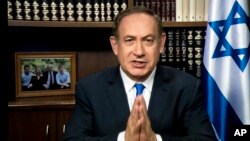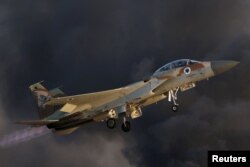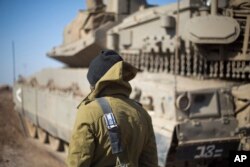Israel won’t allow Iran to entrench itself militarily in Syria, Israeli Prime Minister Benjamin Netanyahu vowed Sunday.
His remarks, in a taped message to a forum in Washington, came just a day after Israeli aircraft attacked a suspected Iranian base outside Damascus and could suggest the Middle East is entering a new volatile phase in a confrontation between Israel and Iran.
“Let me reiterate Israel’s policy,” Netanyahu said. “We will not allow a regime hell bent on the annihilation of the Jewish state to acquire nuclear weapons. We will not allow that regime to entrench itself militarily in Syria, as it seeks to do, for the express purpose of eradicating our state,” he told the Saban Forum, an annual gathering of American and Israeli leaders in Washington hosted by the Brookings Institution.
Citing Saudi Crown Prince Mohammed bin Salman, who recently described Iran's Supreme Leader Ayatollah Khamenei as “the new Hitler of the Middle East,” Netanyahu likened Iran to Nazi Germany, arguing they share in common, “a ruthless commitment to impose tyranny and terror” as well as “a ruthless commitment to murder Jews.”
Some cooperation
His criticism comes amid growing rumors a covert relationship is developing between Israel and Saudi Arabia, united in opposition to Iran and its growing clout in the region. Saudi Arabian officials have denied the claims. Saudi foreign minister Adel Jubeir told an Egyptian television station recently, “There are no relations between Saudi Arabia and Israel.”
But CIA director Mike Pompeo said Saturday Saudi Arabia has been working directly with Israel and Sunni Arab nations in the fight against terrorism.
“We’ve seen them work with the Israelis to push back against terrorism throughout the Middle East,” Pompeo told a security forum in California.
Last month, a senior Israeli minister, Yuval Steinitz, acknowledged publicly that joint enmity for Iran has pushed Israel and Saudi Arabia closer and that the two states, which do not enjoy formal diplomatic relations, had established “partly secret” ties to counter Iran’s influence in the region. It was the first disclosure by a senior Israeli figure of long-rumored secret cooperation between the Jewish state and the Gulf Kingdom, although a top Israeli general had earlier said Israel stood ready to exchange intelligence about Iran with Saudi Arabia or any “moderate” Arab countries.
Israel sending message
On Saturday, Israeli warplanes flying over neighboring Lebanon fired several missiles at a military base Iran is said to be building in Syria close to the country's capital, Damascus, according to a state-run Syrian news agency and foreign media. The Israeli military has not commented on the missile strike targeting a military area near the southern suburb of Kiswah.
Sana, Syria’s news agency, claimed Syrian air defenses had shot down two of the Israeli missiles. Other Syrian media said the airstrike killed a dozen Iranian revolutionary guardsmen.
As the Syrian civil war has drawn Iran deeper into the conflict to shore up its ally, President Bashar al-Assad, Israel has conducted airstrikes against convoys and bases in Syria in a bid, officials say, to prevent Syria and Iran, from transferring sophisticated weapons to Tehran ally Hezbollah, the radical Lebanese Shi’ite movement, which is also fighting in Syria in support of the Assad government.
Some analysts question why Israel decided to strike the base at Kiswah now. For more than a year, there have been claims Iran has been constructing permanent military bases in Syria. On November 10 the BBC broadcast three satellite images taken over several months showing new buildings being erected and other construction work at the site 50 kilometers from Israeli installations on the Golan Heights.
The Israeli airstrike appears to have upped the ante regarding Iran’s military presence in Syria. Last week Israeli media reported that Netanyahu had sent a stark warning to President Assad, via a third party, warning Israel would target his regime if he grants Iran a permanent presence in his country.
The airstrike, say analysts, is to show Israel’s willingness to enforce a red line, and that message may be directed to Assad’s other big foreign backer, Russia. Israel and Moscow have been in negotiations for weeks about a buffer zone along the Israeli-Syria border with the Israelis demanding it extend at least 40 kilometers inside Syria. The Russians, according to Israel diplomats, have agreed only an off-limits zone 10 to 15 kilometers.
Last month, the chief commander of Iran’s Revolutionary Guards, Mohammad Ali Jafari, said Tehran will help rebuild Syria and bring about a lasting “ceasefire.” Iranian state television quoted him as saying, “Hezbollah must be armed to fight against the enemy of the Lebanese nation, which is Israel. Naturally they should have the best weapons to protect Lebanon’s security. This issue is non-negotiable.”






